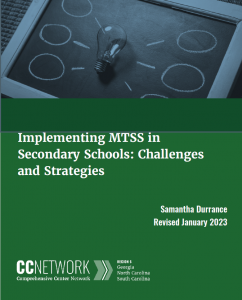
Implementing MTSS in Secondary Schools:
Challenges and Strategies
The purpose of this brief is to provide information about and practical strategies to help secondary schools implement a Multi-Tiered System of SupportS (MTSS) with an academic focus.
Welcome to the Region 6 Comprehensive Center (RC6) MTSS Implementation Stories website. The purpose of this website is to assist those working to inform and improve MTSS implementation in their schools, as well as to share stories from schools that have been implementing MTSS so that other schools and districts might find ideas they can apply to their own journeys in the implementation of MTSS.
To assist those working to inform and improve MTSS implementation in their schools, this site also features key MTSS resources from The MTSS Center at AIR, IES, and other nationally-recognized entities that have published tools and resources for implementers.
History of the Region 6 Comprehensive Center’s Work with MTSS
The Region 6 Comprehensive Center (RC6) at the SERVE Center at the University of North Carolina at Greensboro provides high quality, intensive capacity-building services to state departments of education, school districts, and schools across Georgia, North Carolina, and South Carolina. Since 2019, several of the RC6’s projects have involved providing support in the implementation of MTSS, including reporting on the application of MTSS to early literacy and the identification of students with characteristics of dyslexia in in Georgia and the development of resources describing challenges in implementing MTSS at the high school level for South Carolina.
Over the course of these projects, the RC6 recognized a need and desire among the three states it supports to connect and collaborate with each other on their MTSS structures and supports. A need for more insight into how MTSS can be successfully implemented in different contexts, particularly in secondary schools, also emerged. This website is the result of the RC6’s work to address that need.
What is MTSS?
A multi-tiered system of supports (MTSS) provides a structure and process for schools as they work to identify and address students’ academic, behavioral, social and emotional, and other needs. Implementing MTSS requires collecting and analyzing student data to identify students in need of additional support and determine subject-specific, grade-wide, school-wide and/or district-wide areas for improvement. Schools and districts then develop plans to support students and/or address larger issues by engaging in a process of continuous improvement, including setting goals for improvement, collecting additional data to monitor progress toward those goals, and modifying the plan as needed to reach the goals.
While the structure and general processes involved in implementing MTSS are relatively consistent across settings, each school may implement MTSS in slightly different ways—involving different areas of focus, methods for collecting data, types of supports, and staff to oversee and guide implementation.
Participating States
North Carolina
South Carolina
Georgia
Cross-State Collaborative Team

Samantha Durrance
Project Lead


This website was developed under a grant from the Department of Education through the Office of Program and Grantee Support Services (PGSS) within the Office of Elementary and Secondary Education (OESE), by the Region 6 Comprehensive Center (RC6) at the SERVE Center at UNC Greensboro under Award #S283B190055. This website contains resources that are provided for the reader’s convenience. These materials may contain the views and recommendations of various subject matter experts as well as hypertext links, contact addresses, and websites to information created and maintained by other public and private organizations. The U.S. Department of Education (ED) does not control or guarantee the accuracy, relevance, timeliness, or completeness of any outside information included in these materials. The views expressed herein do not necessarily represent the positions or policies of the U.S. Department of Education. No official endorsement by the U.S. Department of Education of any product, commodity, service, enterprise, curriculum, or program of instruction mentioned in this document is intended or should be inferred.
RC6 @ SERVE Center 5900 Summit Avenue, #201 Browns Summit, NC 27214
Copyright © 2020-2025



